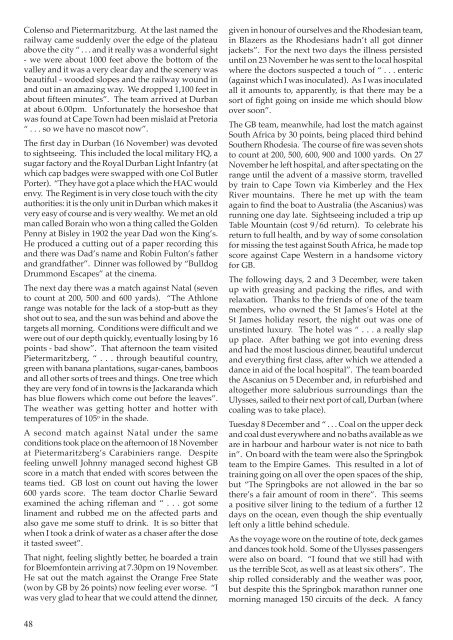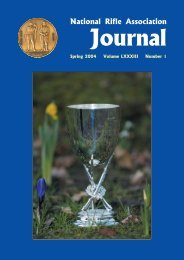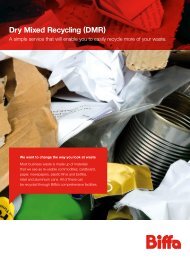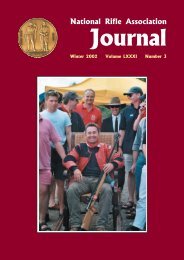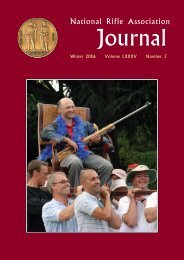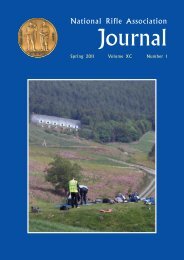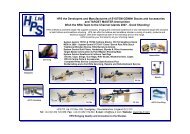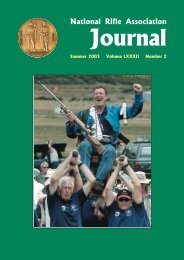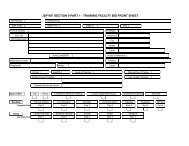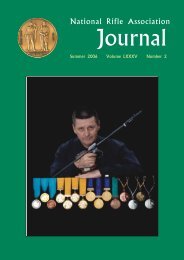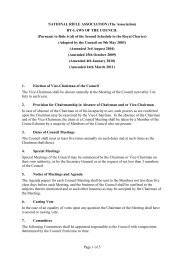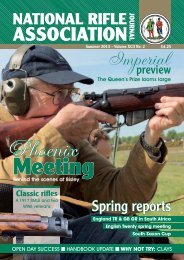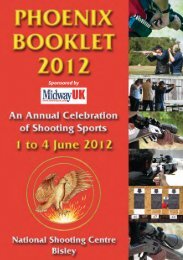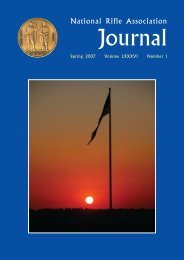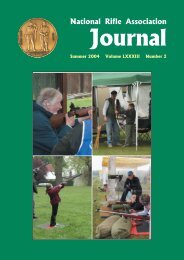NRA Journal - Summer 2007 - National Rifle Association
NRA Journal - Summer 2007 - National Rifle Association
NRA Journal - Summer 2007 - National Rifle Association
- No tags were found...
Create successful ePaper yourself
Turn your PDF publications into a flip-book with our unique Google optimized e-Paper software.
Colenso and Pietermaritzburg. At the last named therailway came suddenly over the edge of the plateauabove the city “ . . . and it really was a wonderful sight- we were about 1000 feet above the bottom of thevalley and it was a very clear day and the scenery wasbeautiful - wooded slopes and the railway wound inand out in an amazing way. We dropped 1,100 feet inabout fifteen minutes”. The team arrived at Durbanat about 6.00pm. Unfortunately the horseshoe thatwas found at Cape Town had been mislaid at Pretoria“ . . . so we have no mascot now”.The first day in Durban (16 November) was devotedto sightseeing. This included the local military HQ, asugar factory and the Royal Durban Light Infantry (atwhich cap badges were swapped with one Col ButlerPorter). “They have got a place which the HAC wouldenvy. The Regiment is in very close touch with the cityauthorities: it is the only unit in Durban which makes itvery easy of course and is very wealthy. We met an oldman called Borain who won a thing called the GoldenPenny at Bisley in 1902 the year Dad won the King’s.He produced a cutting out of a paper recording thisand there was Dad’s name and Robin Fulton’s fatherand grandfather”. Dinner was followed by “BulldogDrummond Escapes” at the cinema.The next day there was a match against Natal (sevento count at 200, 500 and 600 yards). “The Athlonerange was notable for the lack of a stop-butt as theyshot out to sea, and the sun was behind and above thetargets all morning. Conditions were difficult and wewere out of our depth quickly, eventually losing by 16points - bad show”. That afternoon the team visitedPietermaritzberg, “ . . . through beautiful country,green with banana plantations, sugar-canes, bamboosand all other sorts of trees and things. One tree whichthey are very fond of in towns is the Jackaranda whichhas blue flowers which come out before the leaves”.The weather was getting hotter and hotter withtemperatures of 105 o in the shade.A second match against Natal under the sameconditions took place on the afternoon of 18 Novemberat Pietermaritzberg’s Carabiniers range. Despitefeeling unwell Johnny managed second highest GBscore in a match that ended with scores between theteams tied. GB lost on count out having the lower600 yards score. The team doctor Charlie Sewardexamined the aching rifleman and “ . . . got somelinament and rubbed me on the affected parts andalso gave me some stuff to drink. It is so bitter thatwhen I took a drink of water as a chaser after the doseit tasted sweet”.That night, feeling slightly better, he boarded a trainfor Bloemfontein arriving at 7.30pm on 19 November.He sat out the match against the Orange Free State(won by GB by 26 points) now feeling ever worse. “Iwas very glad to hear that we could attend the dinner,given in honour of ourselves and the Rhodesian team,in Blazers as the Rhodesians hadn’t all got dinnerjackets”. For the next two days the illness persisteduntil on 23 November he was sent to the local hospitalwhere the doctors suspected a touch of “ . . . enteric(against which I was inoculated). As I was inoculatedall it amounts to, apparently, is that there may be asort of fight going on inside me which should blowover soon”.The GB team, meanwhile, had lost the match againstSouth Africa by 30 points, being placed third behindSouthern Rhodesia. The course of fire was seven shotsto count at 200, 500, 600, 900 and 1000 yards. On 27November he left hospital, and after spectating on therange until the advent of a massive storm, travelledby train to Cape Town via Kimberley and the HexRiver mountains. There he met up with the teamagain to find the boat to Australia (the Ascanius) wasrunning one day late. Sightseeing included a trip upTable Mountain (cost 9/6d return). To celebrate hisreturn to full health, and by way of some consolationfor missing the test against South Africa, he made topscore against Cape Western in a handsome victoryfor GB.The following days, 2 and 3 December, were takenup with greasing and packing the rifles, and withrelaxation. Thanks to the friends of one of the teammembers, who owned the St James’s Hotel at theSt James holiday resort, the night out was one ofunstinted luxury. The hotel was “ . . . a really slapup place. After bathing we got into evening dressand had the most luscious dinner, beautiful undercutand everything first class, after which we attended adance in aid of the local hospital”. The team boardedthe Ascanius on 5 December and, in refurbished andaltogether more salubrious surroundings than theUlysses, sailed to their next port of call, Durban (wherecoaling was to take place).Tuesday 8 December and “ . . . Coal on the upper deckand coal dust everywhere and no baths available as weare in harbour and harbour water is not nice to bathin”. On board with the team were also the Springbokteam to the Empire Games. This resulted in a lot oftraining going on all over the open spaces of the ship,but “The Springboks are not allowed in the bar sothere’s a fair amount of room in there”. This seemsa positive silver lining to the tedium of a further 12days on the ocean, even though the ship eventuallyleft only a little behind schedule.As the voyage wore on the routine of tote, deck gamesand dances took hold. Some of the Ulysses passengerswere also on board. “I found that we still had withus the terrible Scot, as well as at least six others”. Theship rolled considerably and the weather was poor,but despite this the Springbok marathon runner onemorning managed 150 circuits of the deck. A fancy48


